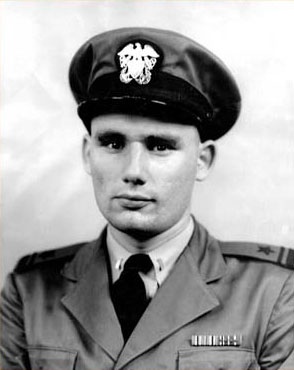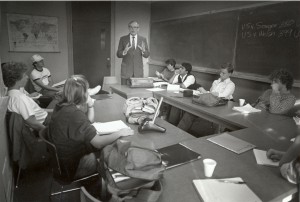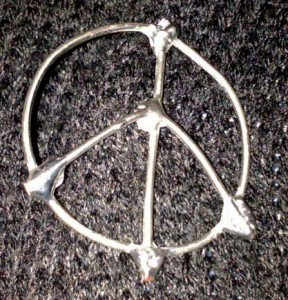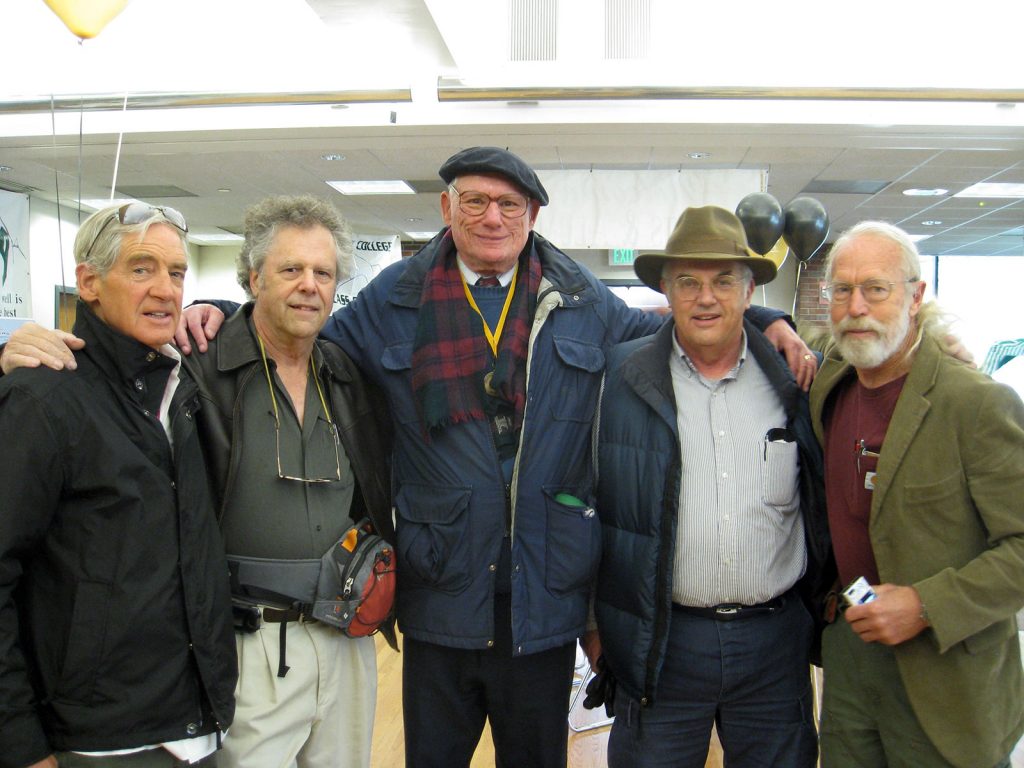By Laurie Laker ’12

From war zones to the Mountain West, Colorado College Professor Emeritus of History William “Bill” Hochman has lived an incredibly full, fruitful, and generous life. His classes, specifically the legendary Freedom and Authority class, helped form the backbone of CC’s liberal arts education as the college grew and developed over the latter half of the last century.
 A junior officer in the United States Navy during WWII, Hochman served in the North African campaign, as well as in the invasions of Sicily, Italy, and Normandy. When his ship was torpedoed and sunk off the Normandy coast, Hochman was rescued by the British destroyer HMS Beagle. Following his experiences in the war, he has devoted much of his life toward the cause of peace.
A junior officer in the United States Navy during WWII, Hochman served in the North African campaign, as well as in the invasions of Sicily, Italy, and Normandy. When his ship was torpedoed and sunk off the Normandy coast, Hochman was rescued by the British destroyer HMS Beagle. Following his experiences in the war, he has devoted much of his life toward the cause of peace.
“When I came home, I was determined to do something useful with my life, perhaps to atone for the fact that I survived while so many of my shipmates perished,” he reflected in the December 2012 issue of the Colorado College Bulletin. Returning home from the war, he decided to be a teacher. Hochman earned his master’s and doctorate degrees in American history from Columbia University, having earned his bachelor’s before the war from that same institution.
Curiously, Hochman’s career in education didn’t actually begin at CC. Initially, he taught and worked as an assistant administrator for the University of Colorado Extension Center, now UCCS, in Colorado Springs. In 1955, he found his way to Colorado College, the place that he has come to call home ever since. Joining the history faculty, Hochman’s career at the college spanned more than five decades of teaching, scholarship, and groundbreaking innovation.

Freedom and Authority, the class that would perhaps best define Hochman’s teaching legacy at Colorado College, was first launched in 1951 as the college’s first-ever interdisciplinary class. Never shy of a challenge, Hochman took the reins from a true titan of the Colorado College, Lloyd E. Worner ’42, the popular history professor and later dean and president of the college from 1964-86.
Making the class his own, Hochman pushed his students to tackle the key issues of any time; the balances and battles between individual freedom and religious, social, and political authority. Tackling these topics, at the time of McCarthyism and the Red Scare, was then a rather controversial thing for Hochman and his students to have done. It stands as testament to the forward-thinking spirit of the college as a whole, never shying away from a challenge.
Prolific both inside and outside the classroom, Hochman attended four Democratic National Conventions, the first as an alternate delegate for Adlai Stevenson in 1960. He was on the Platform Committee at the Democratic National Convention of 1964, and on the Credentials Committee at the tumultuous Chicago Convention of 1968. In 1964, he was named chair of the college’s Education Department and, with the strong support of President Worner, inaugurated a teacher training program uniquely appropriate for a liberal arts college. Faculty-student relationships were at the heart of Hochman’s teaching, even spilling over onto the softball diamond of the college’s intramural scene – on which his talent as a pitcher was quickly recognized, and soon feared! He is particularly proud of having been instrumental in making intramural sports much more inclusive to all members of the campus community.

Peace Pin, handmade by Bill Hochman
Hochman was chairman of the History Department for many years, and served a term as dean of Summer Session. His primary concern was always to strengthen the college’s commitment to the liberal arts, transmitting to students the experience, wisdom and values of the precious cultural tradition we have inherited. He also taught six summers for the University of California at Berkeley.
For decades, peace has been Hochman’s passion. At CC, he taught general studies courses on how people experienced war and on the morality of warmaking. He made and gave away handmade wire peace pins during both the Vietnam and Iraq Wars. At Honors Convocation each year, he awarded a prize for the best student work on the human experience of war. Hochman’s life as an activist and advocate is equal to his life as an educator – perhaps the highest commendation that could be given of his work.
In 1995, after 40 years of teaching, Hochman was awarded the first-ever Gresham Riley Award for his years of continuous service, commitment, and accomplishment to the college community. Retiring in 1998, Hochman left a rarified legacy of institutional impact and cross–disciplinary teaching. He returns to the college regularly, as a visitor in classes, to teach “Freedom and Authority” for Homecoming and special events, and to provide his significant voice to occasions focused on veterans’ affairs and peace. Hochman continues to be a vital component of the college’s past, present, and future. We are honored, and thrilled, to celebrate him here.

Photo courtesy of James Martin ’69, taken in October 2009 at the 40th reunion of the class of 1969. William Hochman is in the center. The others, all members of the class of 1969, are, from left, Tom Gould, Michael Taylor, James Martin, and the late Dean Metcalf.
Professor Emeritus William “Bill” Hochman on the Block Plan
Bill Hochman Retirement Tribute – September 4, 1998
Memorial Service
Read the Spring 2019 Bulletin story, Remembering Professor Emeritus of History, William “Bill” Hochman.
Share your anecdotes and recollections about this wonderful member of our community!
If you have photos of Bill to share, please email them to communications@coloradocollege.edu.




15 Responses to Professor Emeritus William “Bill” Hochman
Bill Hochman has been without a doubt one of the most influential people in my life. As a CC student in the 1950’s I found that his Freedom and Authority course challenged and shaped my deepest beliefs. In recent years I continue to admire him as a colleague and dear friend. He retains the passionate commitment of a great teacher even at the age of 93! He has always stimulated others to examine the most fundamental issues facing America in the 20th and 21st century: questions of war and peace, the meaning of the Bill of Rights, the value of a liberal arts education, the preservation of our civil liberties. Active in the ACLU, a great admirer of FDR, a gadfly about CC hockey and fraternities, still a teacher of American values to juvenile detainees, still an attendee at CC faculty meetings, he continues to come to special events and concerts, and he always cheerfully reminds us when he encounters us to wear the peace pins that he so faithfully made and distributed during the Vietnam and Iraq wars. I firmly believe that Bill Hochman will be remembered as the greatest professor in the long history of Colorado College.
My daughter Laura Finley Black, class of 1989, sent this photo of the peace pins given to her and her daughter Emma by Bill Hochman. Laura and her family live in Paris, France.
An absolute pillar of the community and cutting edge on progressive thinking. A sense of oneself, paramount. Part of the “Mesa Rd Hill Gang”, made up of liberal thinkers testing the waters of conservativism in Colorado Springs. Took, to heart, his religion of upbringing. Open-mindedness in the heart. We had several moments, some of which I might best apologize, where he was gracious and forgiving. Being within the bounds of Colorado Springs for the entirety of his adulthood, his heroism is appreciated by liberal minds.
One can’t fully elaborate about Prof Hochman without writing a book. I had many good teachers at CC and elsewhere, but he was the best.
Whenever I ponder a political position or a question a point of view, I always think about what Bill Hochman would say about it. My takeaway is that one does whatever allows a life of dignity for the most. He is tough minded, a clear thinker, but overall, thoroughly decent. I hope he is able to continue to take strong positions and inject his insight until we make it to the next liberal epoch. When attending a recent reunion including a Freedom and Authority seminar, I feared that perhaps age had changed him. No way. I was delighted to see how many other CC grads from a spectrum of classes shared in my high regard for him. He probed gently, with humor, but firmly as he always did. I hope that the younger CC professors will have the same effect on their students. I bet many do in their own way, and thus CC has a bright future. My best CC memories are of Prof Hochman, classmates, classes and other professors, mountains, and sunshine in that order. One cannot recreate those “best years,” but the lessons learned do last forever; the mark of a great teacher and man.
His first year at CC was also my first year at CC. He was my professor for what I believe was called Western Civilization. His lectures were so well done that reading the text was really not necessary. I also was in his Freedom and Authority class – probably was a senior then. Students would stop by food services and bring over one of those big silver containers of coffee for the class. When Spring came, the class decided lemonade would be better. Students took turns bringing the container over and it seems that one Spring day, someone(s)(it took two people for sure to carry it) it happened that vodka was poured in the container with the lemonade. I do believe that “Doc Hoc” really enjoyed the lemonade that day!
He was and is one of the best ever.
Bill was an inspiration to me, both in the classroom and beyond. I was there when he returned from the 1968 convention and had heard his impassioned pleas for inclusion. He inspired me to take a Freedom and Authority class from another wonderful professor, Dr. Doug Freed. In so many ways, Bill was the epitome of what CC is all about.
Dr. Skip Clark, Dean
Pamplin College of Arts, Humanities, and Social Sciences
Augusta University,
Augusta Georgia
Class of 1968.
Bill has proven to be the most influential teacher in my life. I majored in History and also took his Freedom and Authority class. His passionate and fascinating lectures in history kindled my love of the subject.
A few years back Bill was here in San Diego to chat with our Alumni Group. When he entered the room he gave me a clipping from the New York Times about a new book just out about the Battle of Leyte Gulf. He remembered my deep interest in that topic over 50 years after I had written a paper on it for him at CC!
Bill met my father, Colin, during the early hours of June 9th 1944 as survivors were collected from the waves after their ship was torpedoed. Since Bill and Colin were reunited on HMS Belfast in London we have remained in touch. It has been a real pleasure meeting Bill and Nancy and his family over the years in London. His commitment to peace and education is an example to us all. He’s like a second father.
Greetings from a 1955 class mate. You remember we made you part of our class. Haven’t been to CC in a number of years but hope to make 65 in 2020. Enjoying retirement in Estes Psrk while still working during the summer at Cheley Camps directing leadership training . Still keep in touch with a few of our class. Regards Rich Smith
I was fortunate to have two courses with Prof. Hochman – “Just and Unjust Wars”, and “The Future of Socialism”. He was down to earth and approachable but intellectually rigorous. He was an outstanding teacher who planted many seeds in my mind and my heart that continue to bloom a quarter century later.
Bill was without a doubt my favorite professor at CC. As a history major, He guided me through my studies at CC and encouraged me and others to think differently. That resulted in radically unusual essays and approaches to my studies. In fact, he encouraged my independent study in Australia where I did a comparative analysis of the gold rush’s of Cripple Creek to Hills End. I am saddened by his passing but also reflective in what an incredible life he lived. Heaven will be a better and smarter place for sure.
Bill Hochman RIP.
A quick story that says much about the man:
Among the many history courses I took with Bill, was Recent US History where I wrote a long term paper on the Battle of Leyte Gulf. (The largest Naval battle in World History). 55 years later Bill came to San Diego to speak to our Alumni luncheon. There Bill gave me a New York Times review of a current book on the subject. I marveled that he remembered my interest in the subject and was considerate enough to bring the review.
Hundreds of Colorado College students admired him. He was a major force on the Campus. His impact remains.
Until the time of his death, Bill’s been a tireless presence for peace and thoughtful engagement about military issues. I already valued him as a colleague. But when we, as a group of professors and students from CC and CU-Denver, began working on PTSD and what veterans “bring home” to the Pikes Peak region, I truly cherished his steady, stallwart showing up, wearing his self-made peace-symbol pin, speaking truth, and showing both incisive intellect and thoughtful compassion for all sides amidst difficult issues. Again and again he specifically invited our students to apply for his Human Experience of War best essay prize; little could have affirmed their efforts more than this honor for which he was a devoted caretaker. We’ll miss you, Bill.
Bill Hochman, besides being a very dear friend, has always been an inspiration to me ever since I came to the Colorado College. In fact, prior to my arrival, I saw William Hochman address the Democratic Convention in Chicago in 1968. He gave an eloquent speech about Native Americans and I was mesmerized by it. At the time, I did not know he taught at CC and said to myself, “how much I would like to meet this man”. I had turned on the TV after he had been introduced and was unaware of who he was. Then I arrive at CC in the Fall of the academic year 1968-69, and, as I was introduced at the Faculty Fall Conference, I saw him and learned that he was the Chair of the History Department. I introduced myself and “it was the beginning of a beautiful friendship.” Bill was terribly upset when we played soccer and he was goalie, as Roger Heacock and I dribbled toward the goal and struck the ball with full force. He dreaded those moments. But he was a much better softball player, and organized many a game. Our friendship continued through his painful divorce with Peggy and his romance and eventual marriage to wonderful Nancy. I was at the time a confidant of Bill as he had met this amazing California woman and pondered what to do with his life. Of course, he knew what to do. Well, our friendship continued through the years over many faculty meetings, cocktails and private dinners. I did see Bill at the Carlton Gamer’s recent concert in Packard and promised him I would have him over for spaghetti. I regret that that never happened since we knew he was having some problems as of late but did not expect his death for he seemed immortal. Well, at least his legacy will be. Bill shall be sorely missed and my condolences and those of Kathy go to Nancy. In memoriam, Salvatore Bizzarro
Bill Campbell ’67
As freshmen in the fall of 1963, we were impressed by his memorable “Who am I” speech, in which he challenged us to be introspective about ourselves. Prior to our 50th reunion, I asked him if he could repeat that speech for us. We couldn’t work it into the homecoming schedule, but he quipped, “I gave that speech to so many freshman classes that the Rastall waitstaff was mouthing the words.”
I believe Hochman taught a two-block class in 1981 with another professor whose first name was Susan. Called “The Occasions of War”, it was the most powerful and interesting class I ever took. Thank you Professor.